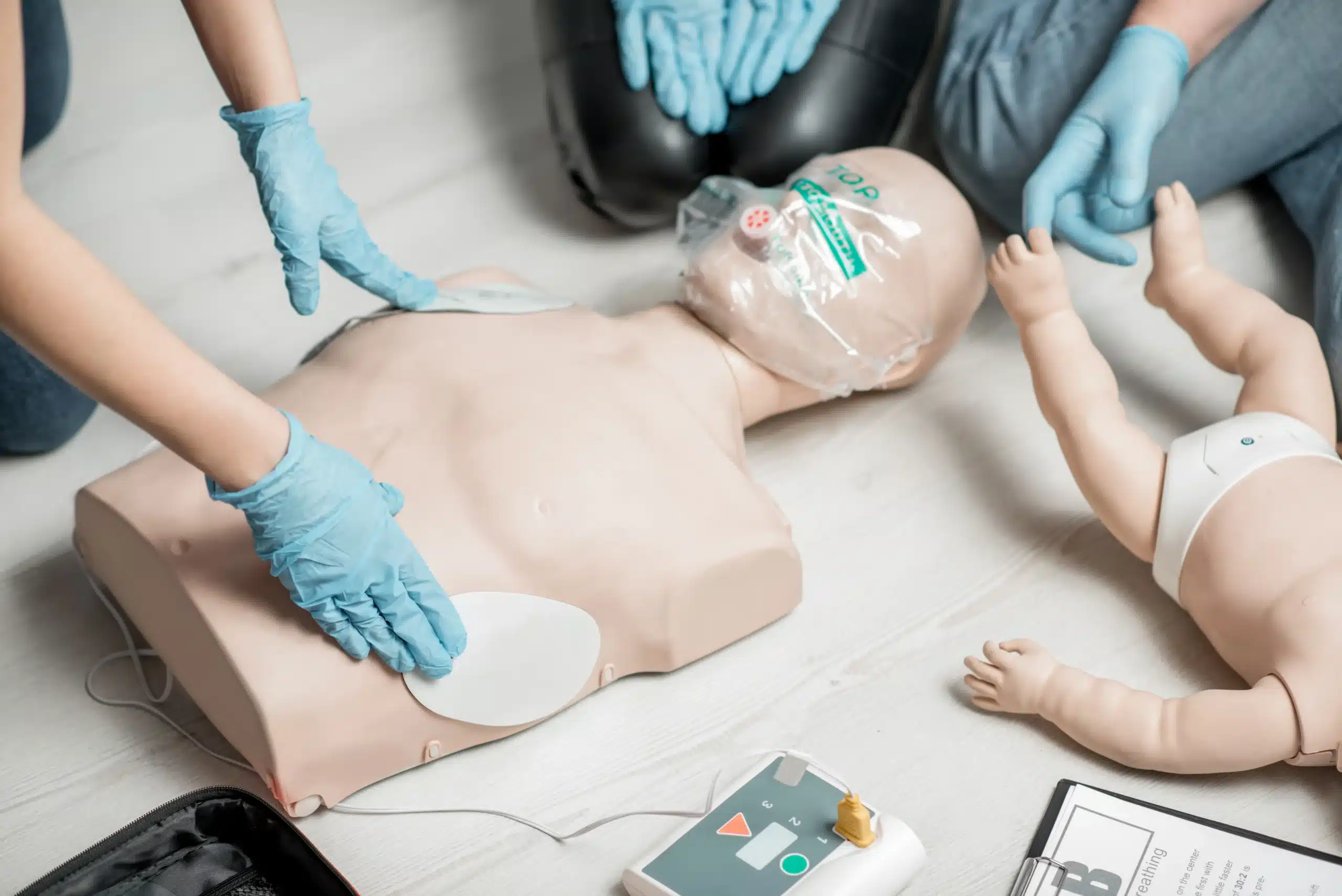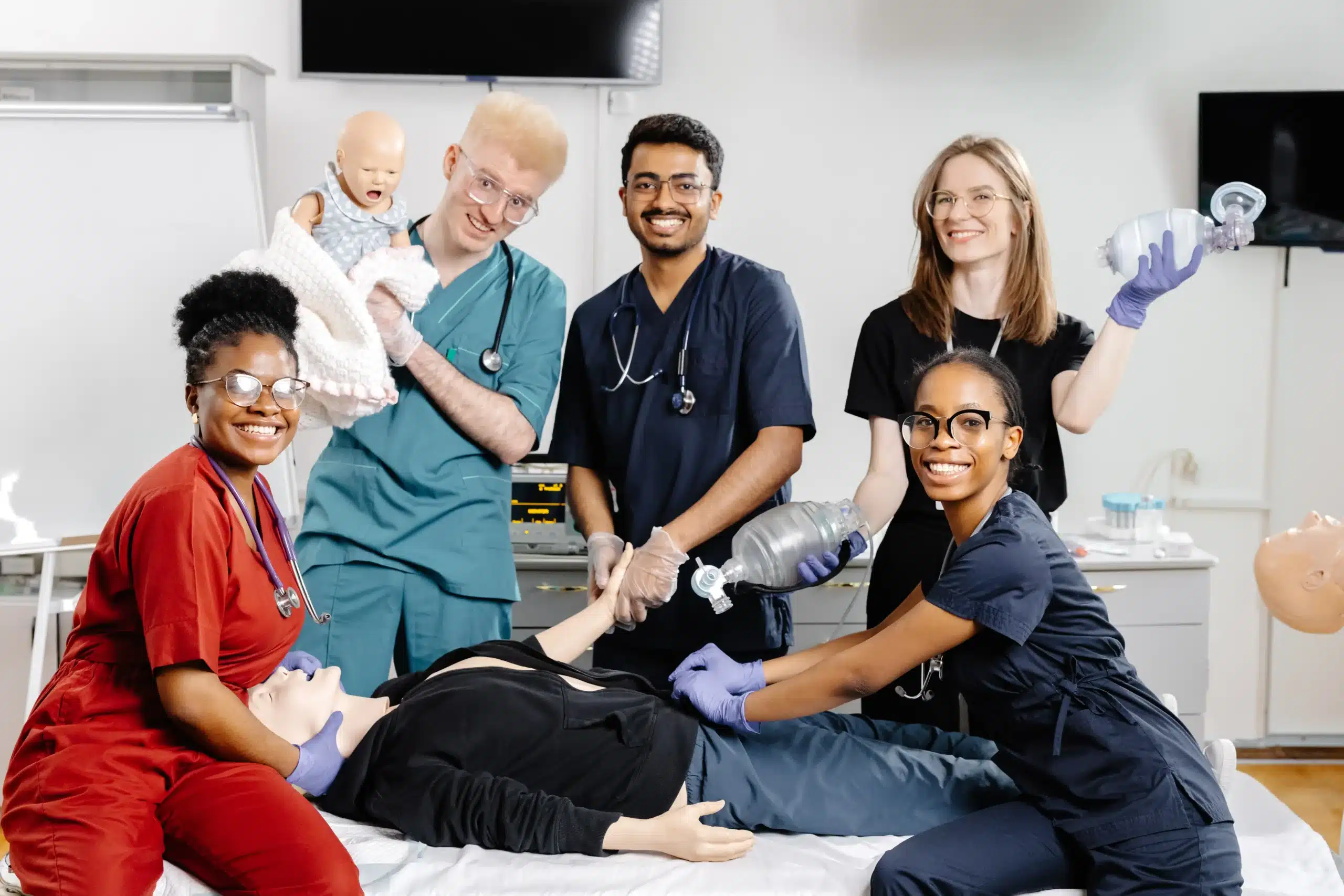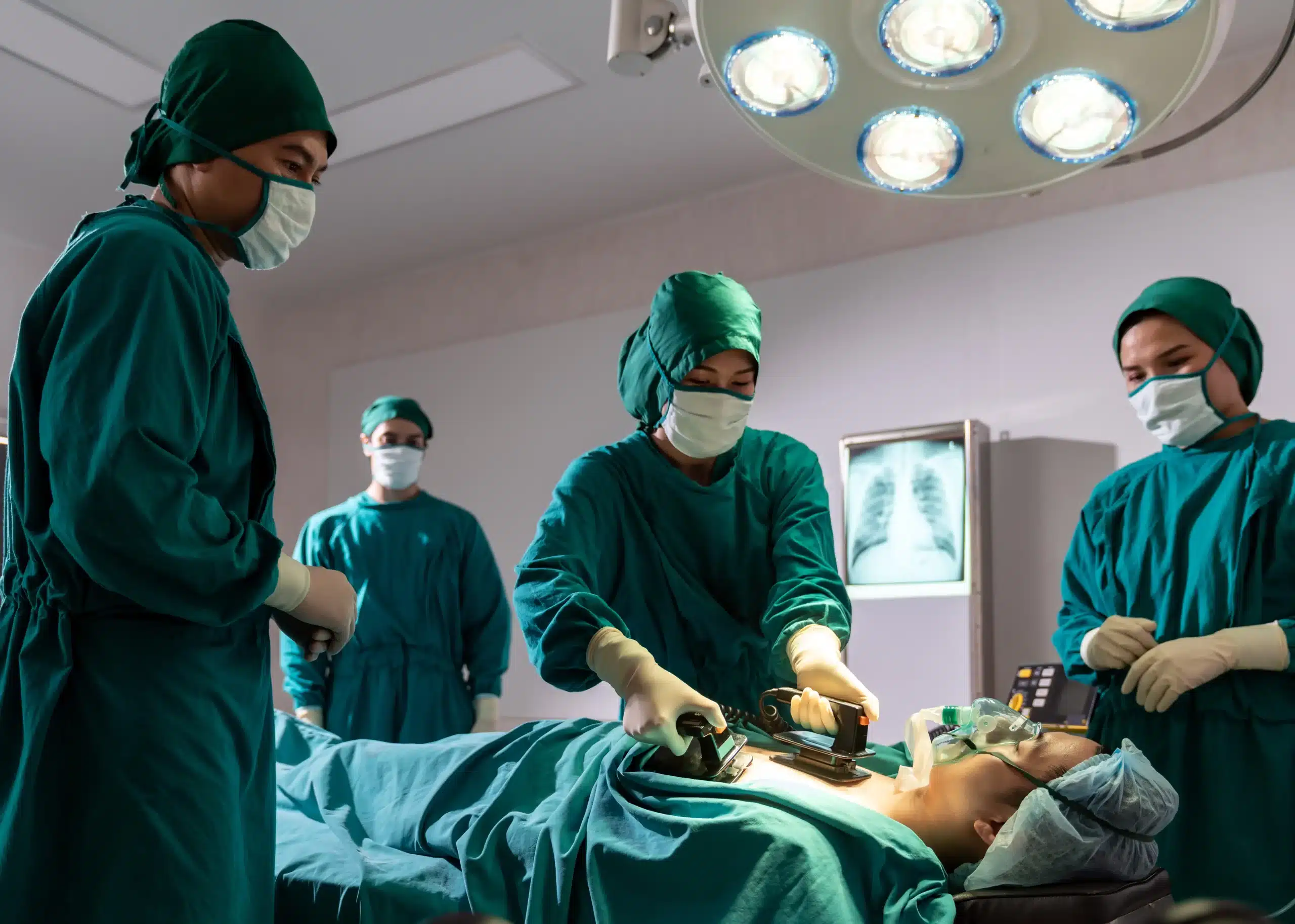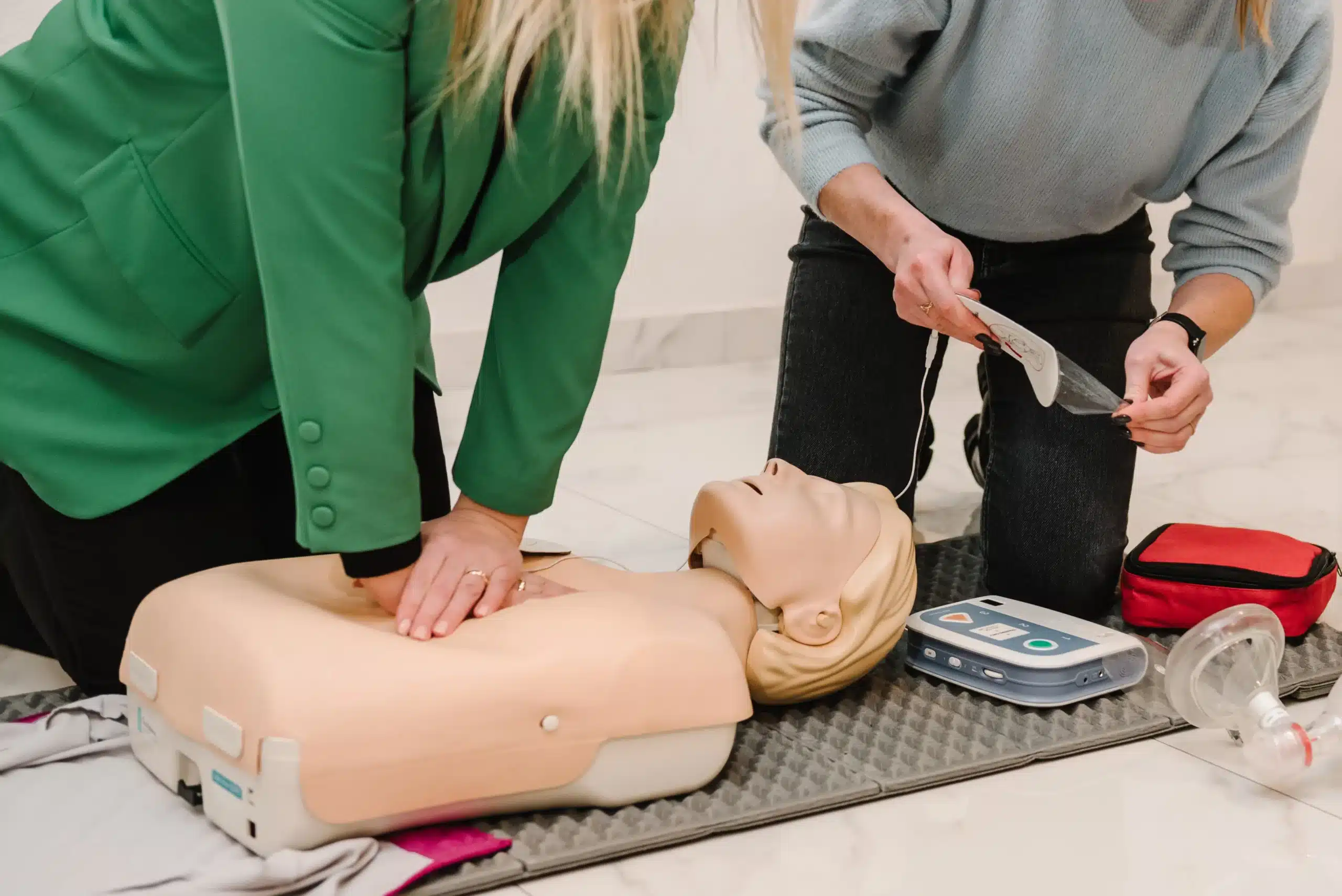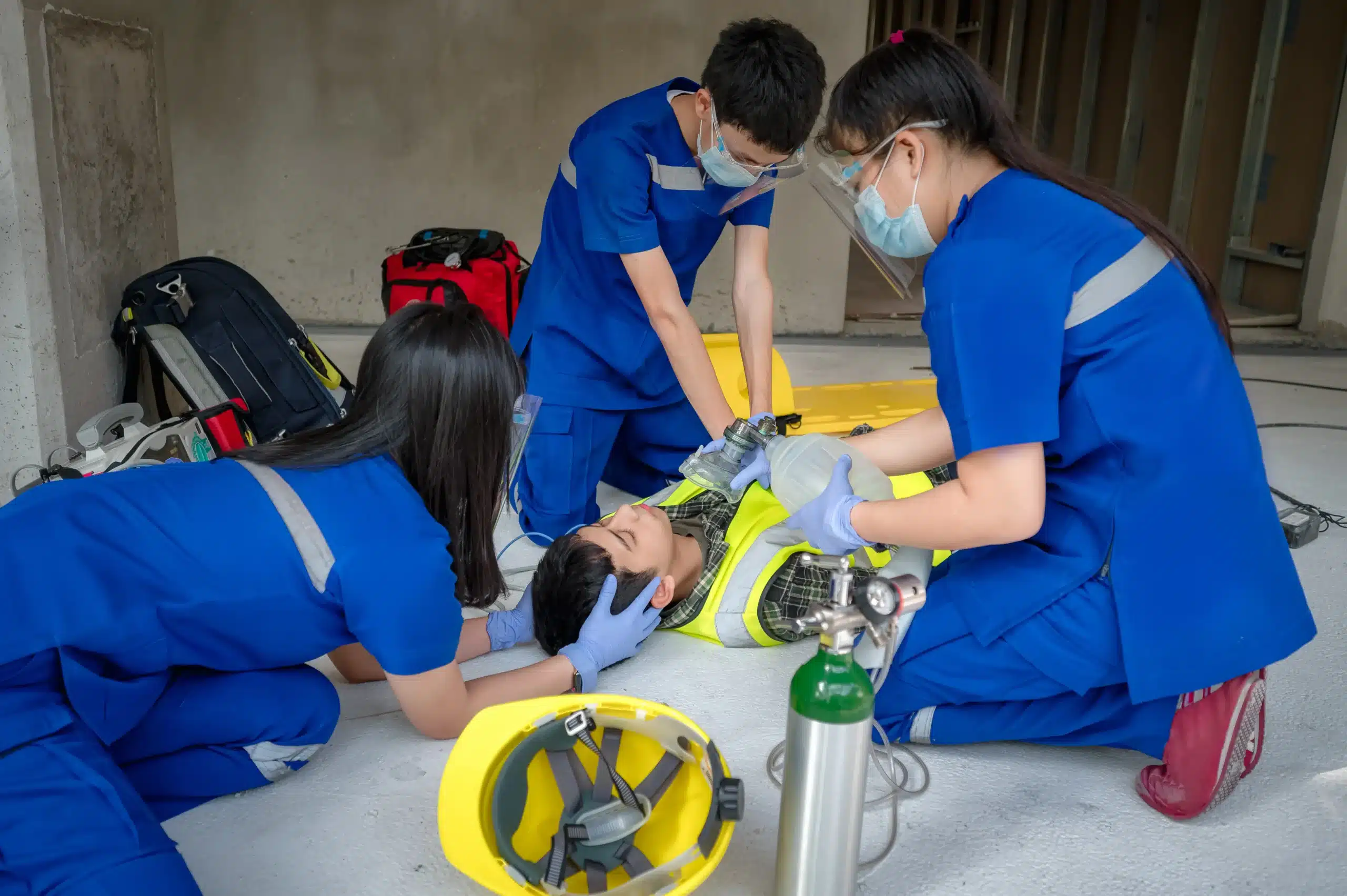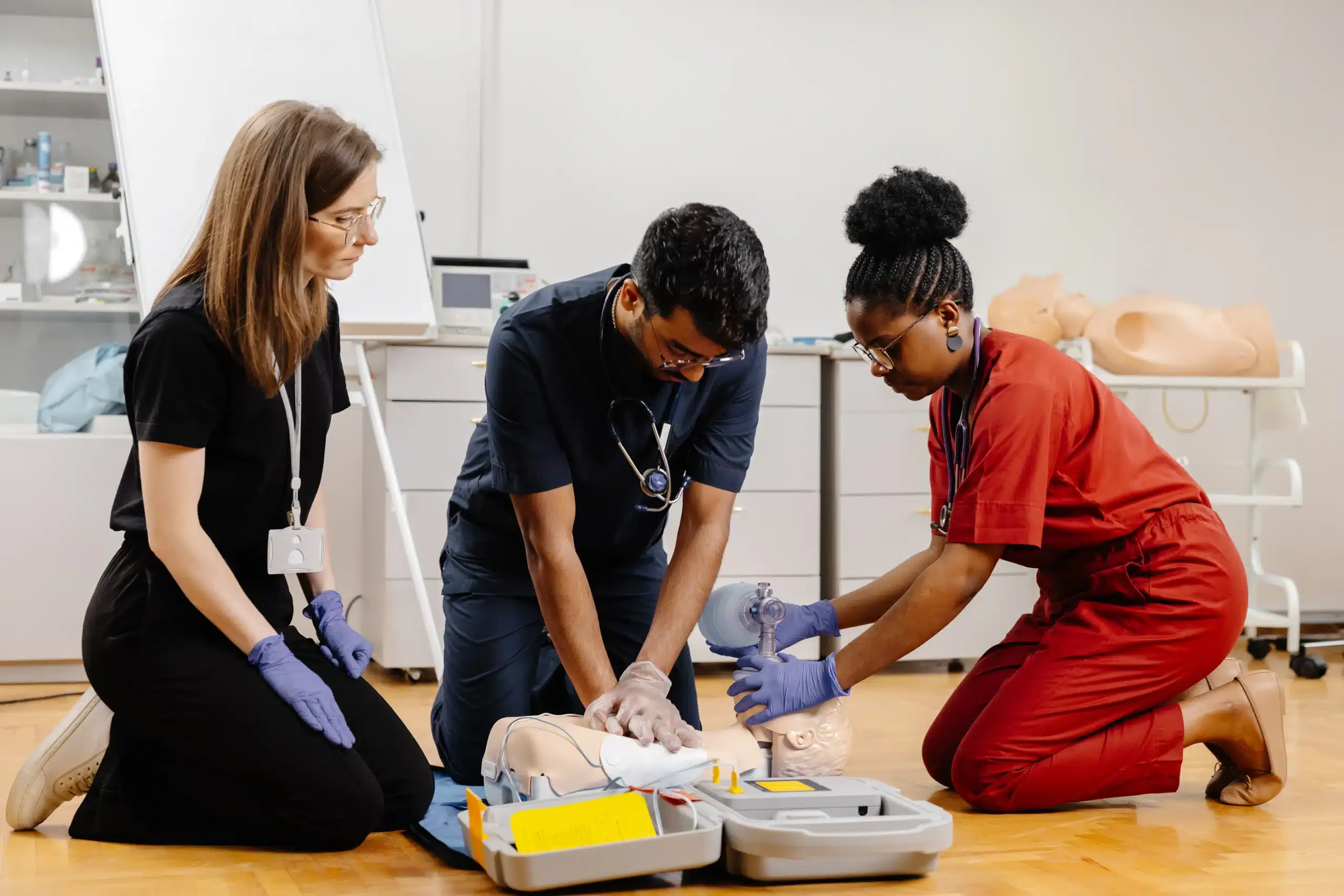As a healthcare provider or someone who wants to be prepared for emergencies, you know how important it is to keep your skills sharp. BLS recertification in Brentwood is more than just a requirement—it’s a commitment to providing the best possible care when it matters most. This comprehensive guide walks you through the process of renewing your BLS certification in Brentwood, covering everything from course options and costs to key skills and common misconceptions. Whether you’re looking for a refresher on CPR techniques or want to understand the latest guidelines, this guide has you covered.
Key Takeaways
- BLS recertification keeps your life-saving skills sharp. Regular renewal ensures you’re confident and competent in CPR, AED use, and airway management, ready to respond effectively in emergencies.
- Finding the right BLS recertification course in Brentwood is easy. Explore various options, including in-person, blended, and online formats, to find a course that suits your needs and schedule. Check with providers like Safety Training Seminars for group discounts.
- Preparation is key to a smooth recertification process. Review the latest AHA guidelines, practice essential techniques, and gather necessary documentation beforehand. Choosing an accredited course from a reputable provider ensures your certification meets professional standards.
What is BLS Recertification?
What is BLS?
BLS stands for Basic Life Support. It’s a critical certification for healthcare providers, first responders, and anyone who wants to be prepared to help in a medical emergency. BLS teaches essential lifesaving skills such as CPR (cardiopulmonary resuscitation), how to use an AED (automated external defibrillator), and relieving obstructed airways. It emphasizes early recognition and response to respiratory and cardiac arrest.
Why Recertify?
BLS certification is typically valid for two years. Recertification is essential for several reasons. First, it ensures your skills and knowledge are current. Medical guidelines and best practices evolve, and recertification courses incorporate these updates. Regular practice reinforces these crucial skills, increasing your confidence and competence during emergencies. Many healthcare jobs and volunteer positions require a current BLS certification, so recertification helps you meet these requirements and maintain your qualifications. Staying certified means you’re always prepared to provide effective, high-quality care when it’s needed most.
Top Brentwood BLS Recertification Providers
Finding the right BLS recertification course can feel overwhelming, but several respected providers in Brentwood make the process easier. Here’s a rundown of your top options:
Safety Training Seminars
Safety Training Seminars offers American Heart Association courses right here in Brentwood. They cover everything from basic CPR and First Aid to BLS, ACLS, and PALS. They also offer more specialized certifications like NRP and EMSA Child Care. Known for their competitive pricing and convenient location, they serve Antioch, Brentwood, and Concord. Check their website for information on group discounts.
American Heart Association
While the American Heart Association sets the standards for CPR and BLS, they don’t directly teach the courses. They authorize training centers like Safety Training Seminars to deliver their curriculum. So, if you’re looking for an AHA-certified course, find a local training center offering these courses.
Red Cross
The Red Cross is another well-known provider of BLS recertification. They offer BLS renewal courses designed to refresh your skills and keep your certification current. Keep in mind that to renew through the Red Cross, you’ll typically need a current or recently expired Red Cross BLS certification.
Local Community Colleges
Community colleges in and around Brentwood often offer BLS recertification courses, sometimes alongside other healthcare training programs. These courses can be a good option, especially if you prefer a more structured learning environment. Many providers, including Safety Training Seminars, offer discounts for group registrations. Check if bundling your BLS recertification with other courses like ACLS or PALS could save you money.
BLS Recertification: Course Formats
As you explore BLS recertification options in Brentwood, you’ll find a few different course formats. Understanding the differences can help you choose the best fit for your learning style and schedule.
In-Person Courses
In-person BLS recertification courses offer a traditional classroom setting. These courses provide hands-on training and direct interaction with a certified instructor. This format allows for immediate feedback, which can be incredibly helpful for mastering essential skills like CPR and using an AED. Safety Training Seminars offers in-person BLS recertification courses right here in Brentwood, making it convenient to find a class that works for you. This face-to-face learning environment is ideal for those who thrive in a structured setting and value personal instruction.
Online Courses
Online BLS recertification courses provide a flexible alternative to traditional in-person classes. You can complete the theoretical portion of the course at your own pace, from anywhere with an internet connection. This format is particularly helpful for those with busy schedules or limited access to transportation. Online courses often incorporate interactive elements and videos to reinforce learning. However, keep in mind that online recertification usually requires an in-person skills check component before your certification is complete. You can find more information on our BLS course page.
Hybrid Courses
Hybrid courses combine the best of both worlds. You’ll typically complete the cognitive portion of the course online, allowing for self-paced learning and schedule flexibility. Then, you’ll attend an in-person skills session to practice and demonstrate your proficiency in essential BLS techniques. This blended learning format is a great option for those who appreciate the convenience of online learning but also recognize the value of hands-on training. Safety Training Seminars offers hybrid BLS courses, providing a balanced approach to BLS recertification.
Pros and Cons of Each Format
Each format has its own advantages and disadvantages. In-person courses offer immediate feedback and a structured learning environment, but they require a fixed time commitment. Online courses offer flexibility and convenience, but they may not provide the same level of hands-on practice. Hybrid courses offer a balance of both, but they require coordinating both online and in-person sessions. If your BLS certification has lapsed, you might need to take a full BLS course rather than a recertification class, so keep this in mind when choosing your format. Consider your learning style, schedule, and any potential certification requirements when making your decision. For those looking for group discounts, check out our group class options.
BLS Recertification Costs in Brentwood
If you’re a healthcare provider in Brentwood, keeping your Basic Life Support (BLS) certification current is essential. But how much does BLS recertification cost? Let’s break it down.
Average Price Range
BLS recertification courses in Brentwood generally fall within the $65 to $120 range. Several factors can influence the final cost, such as the training organization, the course location, and whether you choose an online, in-person, or blended learning course. Many providers offer group discounts, so if your workplace has multiple people needing recertification, it’s worth asking about group rates.
Factors Affecting Cost
The cost of your BLS recertification also depends on the organization providing the training. You’ll find courses from the American Heart Association (AHA), the Red Cross, local community colleges, online platforms, and specialized training companies. Each option has pros and cons regarding price, scheduling flexibility, and the amount of hands-on practice included. This variety allows you to find a course that suits both your budget and learning style.
Discounts and Promotions
Looking to save money on your BLS recertification? Keep an eye out for discounts and promotions. Safety Training Seminars often has special offers on AHA courses, including BLS. They also offer on-site training, which can be more convenient and might save you travel time and expenses. Checking with your local chamber of commerce or training providers like Safety Training Seminars for the latest deals is always a good idea. You can also explore additional resources like our Northern California CPR directory for more options.
How to Renew Your BLS Certification
Getting your BLS recertification in Brentwood is straightforward. This section breaks down the process, required documents, and how often you need to recertify.
Renewal Steps
The first step is finding an accredited BLS renewal course that fits your schedule. Safety Training Seminars offers a variety of BLS renewal courses right here in Brentwood, designed to refresh your skills and knowledge. Generally, BLS renewal involves completing the course, which includes a written exam and a skills demonstration. Once you successfully complete these components, you’ll receive your updated BLS certification card.
Required Documentation
Before you head to class, make sure you have the necessary documentation. Most providers require proof of your current or recently expired BLS certification. This usually means bringing your current BLS card to the renewal course. If your card has expired, check with the training center about their grace period policy. Some providers, like the American Red Cross, may allow renewal within 30 days of expiration.
Renewal Frequency
BLS certification is typically valid for two years. Staying current with your certification is essential for healthcare professionals and anyone working in a field requiring BLS. Regular renewal ensures you’re up-to-date on the latest life-saving techniques and guidelines from organizations like the American Heart Association. For more information on maintaining your certification and finding a course near you, check out our BLS Renewal Near Me Guide.
Key BLS Recertification Skills
BLS recertification courses cover essential lifesaving skills. These skills are crucial for healthcare providers and anyone else who needs to respond to medical emergencies. Let’s explore some of the key areas covered:
High-Quality CPR
High-quality CPR is the cornerstone of BLS. Your recertification will emphasize proper chest compression technique, depth, and rate. It also covers recognizing the signs of a cardiac arrest and quickly initiating CPR. Staying up-to-date on the latest CPR guidelines ensures you’re providing the most effective care. For a practical guide to BLS renewal, take a look at this helpful resource.
AED Use
Automated External Defibrillators (AEDs) are lifesaving devices that can restore a normal heart rhythm during sudden cardiac arrest. BLS recertification reinforces how to correctly use an AED, including proper pad placement and following the device’s prompts. It also covers recognizing when an AED is needed and how to integrate its use into the CPR process.
Airway Management
Effective airway management is critical in a medical emergency. BLS recertification reviews techniques for opening and maintaining a patient’s airway. This includes how to use airway adjuncts and how to recognize and address airway obstructions. Proper airway management ensures the patient receives adequate oxygen. For a complete guide to BLS recertification, including airway management techniques, visit this informative page.
Team Dynamics in Emergencies
Responding to emergencies effectively often requires a coordinated team effort. BLS recertification emphasizes the importance of clear communication, roles, and responsibilities within a team. You’ll learn how to work together seamlessly to provide the best possible care during a crisis. Learn more about team dynamics and other essential aspects of BLS recertification in this comprehensive guide.
Choosing the Right BLS Recertification Course
Finding the right BLS recertification course means considering a few key factors to ensure it fits your learning style, schedule, and budget. Don’t just sign up for the first class you see—take some time to evaluate your options.
Factors to Consider
Think about what’s important to you in a learning environment. Do you prefer a traditional classroom or the flexibility of online learning?
- Course Format: BLS recertification courses often use a blended learning format, combining online coursework with in-person skills practice and testing. This lets you learn the material at your own pace online and then show your skills in person. Safety Training Seminars offers a variety of course formats.
- Duration and Flexibility: Consider how much time you can dedicate to recertification. Some courses are a single day, while others offer more flexible scheduling. If you’re balancing work and other commitments, look for a provider like Safety Training Seminars that offers weekend or evening classes. They also offer discounts for groups, a great option if you’re recertifying with colleagues.
- Accreditation: Make sure your chosen course is accredited by a recognized organization like the American Heart Association (AHA). AHA-accredited courses meet high standards and are accepted by most healthcare employers. The AHA offers various BLS renewal options, from online courses to in-person classes.
Questions to Ask
Before committing to a course, ask the provider a few key questions:
- What does it cost? CPR recertification costs vary. Safety Training Seminars offers a low price guarantee for BLS renewals in Brentwood, making it a budget-friendly choice. They also offer other certifications, including CPR, ACLS, PALS, NRP, EMSA, and First-aid.
- What are the scheduling options? Ask about class schedules and availability. Safety Training Seminars has classes every day of the week, including weekends, for busy schedules.
- What’s the recertification process? Understand the steps to renew your certification. If your current certification is expired, you might need a full BLS course instead of just recertification. Resources like Stockton CPR Certification offer guidance on this process.
Prepare for Your BLS Recertification
Getting ready for your BLS recertification doesn’t have to be stressful. With the right approach, you can walk into your course feeling confident and prepared. Here’s how to get ready:
Study Materials and Resources
BLS recertification courses often use a blended learning format. This means you’ll complete some online coursework and then participate in hands-on skills practice and testing in person. This lets you learn at your own speed and get comfortable with the material before demonstrating your skills. The American Heart Association (AHA) offers several BLS renewal options, from online courses to traditional in-person classes, so you can choose the format that works best for you. Safety Training Seminars provides helpful resources and information on course options.
Practice Techniques
One of the biggest mistakes people make when recertifying is not reviewing the material beforehand. BLS guidelines can be updated, so it’s important to familiarize yourself with any changes. Check with your chosen provider, such as Safety Training Seminars, for the most up-to-date information and resources. Also, remember to schedule your in-person skills check and testing. Forgetting to do this can cause delays or even mean you miss your recertification deadline.
Day-of-Course Tips
On the day of your course, make sure you’re set up for success. Safety Training Seminars offers in-person BLS courses in Brentwood, making it convenient to find a class that fits your schedule, even on weekends. Arrive a little early, bring all required materials, and be ready to participate in both the classroom discussions and the hands-on practice. Being prepared will help you get the most out of your recertification course.
Maintain Your BLS Skills
Once you’re BLS certified, staying sharp is key. It’s like any skill—consistent practice keeps you ready for a real emergency. This section covers how to keep your skills fresh and stay up-to-date on the latest guidelines.
Ongoing Practice
Think of BLS recertification as a starting point, not the finish line. Regular practice after your BLS renewal is crucial. Hands-on training and simulations create muscle memory, so you can respond effectively under pressure. Consider joining refresher courses or practicing with colleagues to reinforce your skills. Even simple things like reviewing the steps for high-quality CPR can make a difference. For healthcare professionals maintaining your BLS certification is crucial, and requires completing Continuing Education Units (CEUs). Staying proficient isn’t just about checking a box; it’s about being truly prepared to help when it matters most. Your confidence and competence will directly impact patient outcomes.
Guideline Updates
Staying current with American Heart Association (AHA) guidelines is just as important as the initial training. These guidelines can evolve, reflecting the latest scientific research and best practices. Changes might include updates to CPR techniques, AED protocols, or airway management procedures. Subscribing to AHA updates or periodically reviewing their website ensures you’re always in the know. Being aware of these changes isn’t just about passing the next recertification test; it’s about providing the most effective care based on current recommendations. Remember, healthcare is a constantly evolving field, and committing to lifelong learning is part of being a responsible and effective provider.
BLS Recertification Myths
Let’s clear up some common misconceptions about BLS recertification. These myths can sometimes prevent people from getting the training they need, so let’s set the record straight.
Who Needs to Recertify?
A common misconception is that only certain healthcare professionals need to maintain a current BLS certification. While BLS certification is vital for healthcare providers like doctors and nurses, it’s also incredibly valuable for anyone who might find themselves in an emergency situation. Think parents, teachers, coaches, childcare providers—anyone who wants to be equipped to help. BLS teaches essential life-saving skills like CPR and how to use an AED, empowering individuals to respond effectively in crises. For a deeper dive into who can benefit from BLS training, check out our BLS Renewal Near Me Guide.
Online Course Validity
Another common myth is that online BLS certification isn’t as credible as in-person training. This simply isn’t true. Many reputable organizations, including the American Heart Association, offer fully accredited online BLS courses that meet the same rigorous standards as classroom-based programs. These online courses are accepted by most healthcare facilities and employers, offering a flexible and convenient way to renew your certification. Just be sure to choose a program accredited by a recognized body, like those offered through ACLS.com, which hold accreditations from organizations like the ADA, AMA, and ANCC.
Time Commitment
Many people believe that BLS recertification requires a huge time commitment. In reality, renewal courses are significantly shorter than the initial certification. While initial BLS certification might take longer, BLS renewal courses are typically streamlined, often taking around 2.5 hours. This makes it much easier to fit into a busy schedule.
Related Articles
- BLS Recertification Near Me: A Practical Guide – Brentwood CPR Classes
- BLS Certification in Brentwood: Your Complete Guide – Brentwood CPR Classes
- BLS Renewal in Brentwood: Your Complete Guide – Brentwood CPR Classes
- AHA BLS Renewal Near Me: Your Complete Guide – Brentwood CPR Classes
- Find BLS Classes Near Me: Your Certification Guide – Brentwood CPR Classes
Frequently Asked Questions
How often do I need to renew my BLS certification? BLS certification is typically valid for two years. Staying current is essential, especially if you work in healthcare. Regular renewal ensures you’re up-to-date on the latest life-saving techniques and guidelines.
What’s the difference between BLS certification and recertification? Initial BLS certification teaches you the fundamental skills. Recertification courses are designed for those with a current or recently expired certification, offering a refresher on essential techniques and the latest guidelines. If your certification has lapsed, you’ll likely need to take the full BLS course again.
Are online BLS recertification courses accepted? Yes, many reputable organizations offer fully accredited online BLS recertification courses. These courses meet the same standards as in-person training and are widely accepted by employers. However, they often include an in-person skills check component.
What’s the typical cost of BLS recertification in Brentwood? BLS recertification courses in Brentwood typically range from $65 to $120. The price can vary based on the training provider, course format, and any available discounts.
What if my BLS certification has already expired? If your BLS certification has expired, you might need to take a full BLS course rather than a recertification course. Check with your chosen training provider about their policy on expired certifications and any grace periods they offer. They can guide you on the best course of action.


